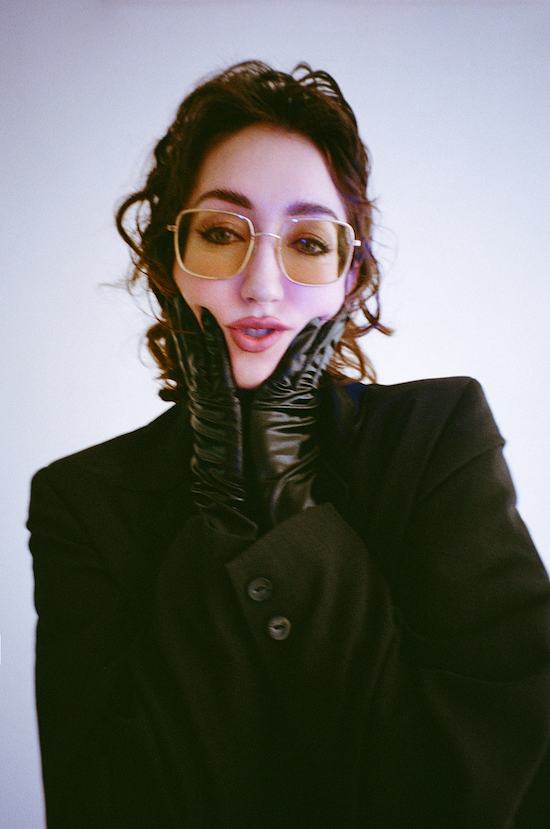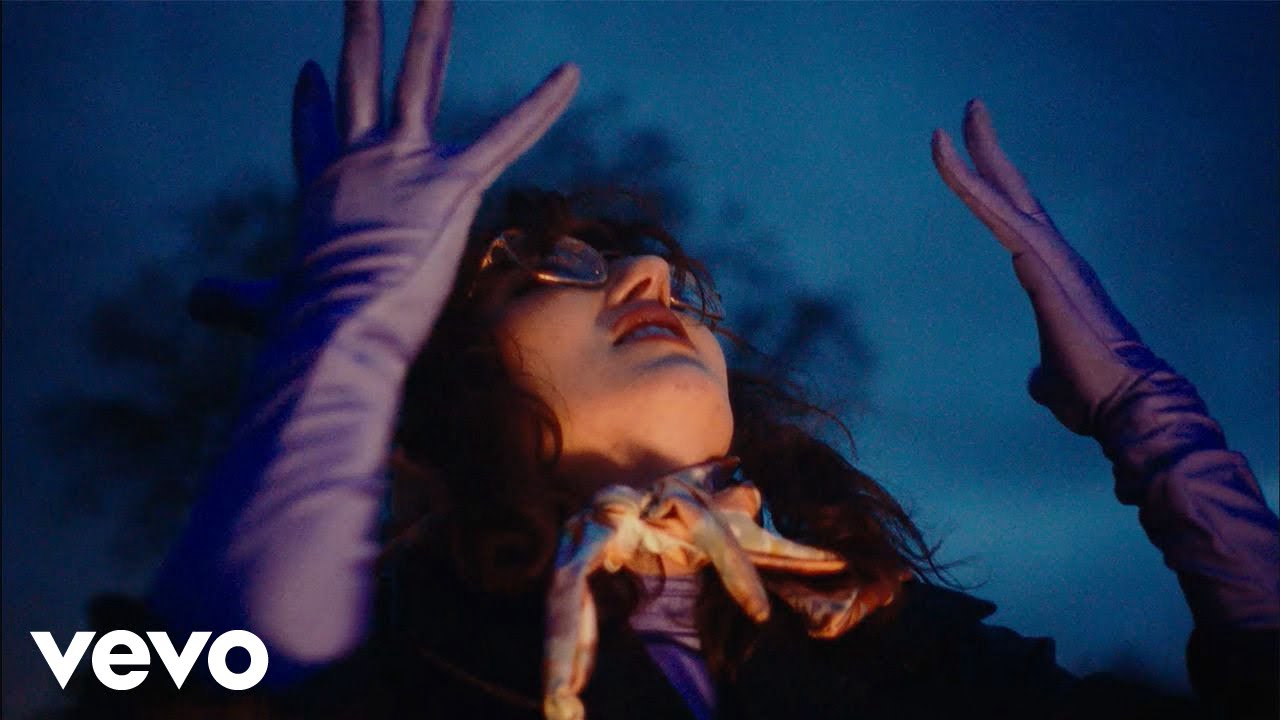Photos by Nan Moore
Jessica Winter came to music as if by necessity; as a child, she was diagnosed with hip dysplasia, and the resulting surgeries intended to correct the painful, malformed joint left her in considerable discomfort. The corrective brace she needed to wear afterwards meant that the piano bench was the only spot in the home that made for a comfortable seat—the instrument growing from a way to pass the time, then becoming a safe haven, an intimate friend, an adventurous escape.
As the years passed, her passion led her away from the upright piano and out into a vast musical spectrum. Winter’s long resume features punk bands, indie rock, 80s-indebted duo Glass, and experimental pop outfit Pregoblin, as well as co-running Hate The Haus, a series of art and music events in support of philanthropic organizations. But all along, Winter kept writing and recording her own songs, seeing where that long path of artistic exploration would lead. The resulting series of singles and EPs have been lauded for their ability to fuse slippery rhythms, dense fields of sound, immaculate hooks, and gothic tones.
That supernatural intermingling grows yet deeper on upcoming EP Limerence, a set of songs that amplifies Winter’s interest in the immediacy of dancefloor production without sacrificing any structural complexity. The leathery and glistening ‘Funk This Up’ epitomises her unique blend, lyrics that detail how she’s about to ruin everything over what may be the most DJ-ready groove in her solo catalog—all gloopy bass synth and clap-along drum machine. Elsewhere, ‘Choreograph’ reaches a goth stratosphere with Perfume Genius-esque synthesised string arrangement and an epic pop arc. Joined by electropop provocateur Lynks on ‘Clutter’, Winter swaggers on a surreal trap beat.
Her music growing ever tauter, more explosive, more magnetic, Winter is already beginning to map out a full album followup, but her next step is a tour of the UK and Ireland in support of viral pop icon Rebecca Black on the horizon — not to mention a slew of summer festivals. tQ caught up with the London-based artist just before the release of the new EP to talk process, maintaining a sense of self in a treacherous industry, and the story so far.
Your introduction to music is so closely tied to a personal trauma, but does that continue to be a prominent instigator in your writing?
Jessica Winter: Rather than moaning about my own personal struggles, I try and think about what I need and then try and make that a song. I focus instead on subjects that I’m interested in—that’s what I get out of [other people’s] songs. The downside is you then only get a few good songs at a time. I’m quite envious of people that think that they can write a great song every time they go to the piano or whatever. When I get one I’m just like, "[Gasp] Oh, there it is." I get so excited when it’s a good song—but they aren’t all the time. I’ve got so many bad ones!
But you’re so close to the process, how do you possibly know if a song is good or bad?
JW: Oh, you just feel it in your bones. You’re never thinking it’s bad in the moment, but it only takes 12 hours, and then you are like, "Oh yeah, that’s utter shit." But the feeling of a good one outweighs the bad ones.
That must have come from a long refining of your process, a lot of trial and error. Pushing forward through that really seems to be key to finding your sense of creativity.
JW: It’s a craft at the end of the day. I’ve been doing it over about 10 years now and I’ve learned so many things along the way. The way that the music industry is constructed, you get so much more attention when you [start out] than you get 10 years later. I feel like I’m really reaching my peak and writing bangers, and then it can be like, "Oh no, we’re not interested anymore actually." Luckily I feel times are changing slightly and I’m lucky enough to be in this era where I can still have a voice and put out songs and people enjoy them.

The curtain has been pulled back a little. Branding was such a taboo term for artists even a few years ago, but now you need to understand your identity closely, to be able to keep being yourself when you face this mass of criticism. When you started ten years ago, did you have that same understanding and determination of self.
JW: I’ve never thought of it like that. [Back then] I was fresh from Portsmouth and had no idea how anything worked, so I feel like I was quite taken advantage of. I just always wanted to perform and write music. I was just much more naive then. Whereas now I just know not to trust anybody! Ten years ago I didn’t know who I was at all. I was heavily into psychedelic drugs and wearing 60s outfits nonstop. That definitely helped me find who I was, but I wasn’t quite there at that point. Now I feel like I definitely know more about what I want in life, who I want to be, what people I want to surround myself with.
That’s such a powerful realisation to come to. Even with the music industry changing, it can be really easy to lose yourself along the way.
JW: Especially when you have straight men constantly telling you who to be, what to sound like. I think I’m just a control freak now. But I do bring in collaborators all the time—most of the tracks [on the EP] have other producers on there. It’s really good to get a fresh perspective, even if they’re just adding a little sparkle on the top. It’s just better to know that you are happy with what you’ve done yourself first, and then people can add to it. So I get it to a point where I’m like, "Yeah, now it kind of can’t be ruined," and then I allow it to go to someone else.
I felt as if the acoustic piano that you filter into ‘Choreograph’ must have been one of those moments. It ties back to your childhood, learning piano almost as a necessity.
JW: I wrote the main essence of that one in a day, but then just refined it over a week. I couldn’t leave that song alone. Before I changed my mind on anything from any other piece of music on the EP, I just had to sit at that piano every day and refine, refine, refine. When I say refine, I mean just change one word or change one note slightly at one point. Now that you mention it, I think that’s actually my first piano-led song. But maybe that’ll be what I do on the next album. Who knows?
Can you tell me a bit about working with Lynks on ‘Clutter’? How do you choose who you collaborate with?
JW: I always really like things that come naturally. I met Lynks when I was in PREGOBLIN, and Lynks was supporting us. He heard [2022 EP] Sad Music and said he loved it and started bigging me up and fanning me, which was great because I was a fan too. We went on tour in March, had a great time, and then went to the studio and ‘Clutter’ was born. I had written the entire song but left the verse blank for Lynks.
It can be really transactional, but we also love each other’s music. We’ve seen each other through the worst and the best times and we’re just gonna enjoy what we do on each other’s songs. It’s all just natural because of the right energy. I was talking with Tom Rasmussen [Vogue columnist, author, musician] about the relationship between girls and gay guys, and how it’s way deeper than just having fun going out at the club. Me and Lynks have that. Tom was saying how it’s about ultimate femininity and women’s empowerment. If you go, "I like you" to a gay guy, it’s like everything they need. And then if a gay guy comes up to a straight girl and says, "Oh my God, you look fabulous," they’re not trying to shag you or anything and it’s such a good compliment! When collaborating with Lynks, I definitely didn’t have that fear that he’s just gonna try and come onto me. It’s pure love of the music and our craft.
How did you make the leaps between playing piano as a child to being involved in the punk scene, then to these complex, dance-indebted compositions? Were those conscious shifts you were making?
JW: My childhood was quite traumatic. Being an adult teenager and then in my early twenties, I was quite lost and found myself playing in different bands. Sometimes I’d just be playing one note on an organ, shaking a tambourine, but I was loving it. I’ve always written my own songs, ever since I was 16, but I didn’t realise that I wanted to do it properly. I just was doing it because I loved doing it. I had to do it. It’s just a necessity. I had a bad psychedelic 60s band, and then I had a more 90s electronic duo called Glass. I was in a punk band as well called Rotten Luck, when I was like 16.
That’s such a good name!
JW: Yeah. It’s the only good thing about that actually! But now that I’ve realised what I want to do, who I want to sound like, there’s no time to waste. Let’s get all the songs out there.
I also wanted to ask about ‘Funk This Up’, which feels like a massive step forward for you. It opens with this dark dance pop vibe and your beautiful vocals, while the lyrics focus on bad behaviors and addiction. It’s a dizzying balance – is she going to throw me in a bed of roses or a vat of lava?
JW: That’s exactly what I want to do with music! I wanted to dress it up with the sweetest lyric: "We’re just about to funk this up." In any other song, it would be the cheesiest lyric ever written. But it’s juxtaposed to this weird drum machine fed through a cassette tape, and it’s about a completely different subject than dancing. Maybe it’s because I love musical theatre as well, where some of the best shows have got the big Hollywood storyline, but then the thing underneath is really political and it can change society. I really am obsessed with trying to find that happy balance.
Jessica Winter’s new EP Limerence is released on 10 February via Lucky Number



